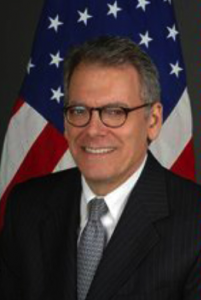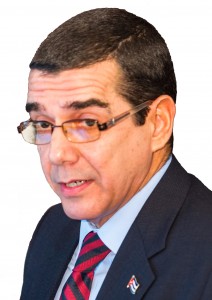
CUBA STANDARD — After half a year and three rounds of negotiations, followed by a month of silence, the presidents of Cuba and the United States exchanged letters on July 1 to reestablish full diplomatic relations by opening their respective embassies in Washington and Havana as of July 20.
This historical step ends 54 years without, or with rudimentary, diplomatic relations and is the first major tangible result since the Dec. 17 announcement by Barack Obama and Raúl Castro that the neighbors are seeking to normalize relations.
In making the announcement on the steps of the White House, flanked by Vice President Joe Biden, Obama called the move “yet another demonstration that we don’t have to be imprisoned by the past,” called on Congress to “do the same,” and mentioned that Brazilian President Dilma Rousseff — in Washington for a state visit — applauded the move.
“This is what change looks like,” he said.
He also announced a visit to Cuba by the U.S. Secretary of State, the first since 1945.
“Later this summer, John Kerry will travel to Havana to properly raise the American flag,” Obama said.
The Cuban foreign ministry announced that Foreign Minister Bruno Rodríguez will be in Washington July 20 for the opening ceremony at the Cuban embassy. Rodríguez will be accompanied by “distinguished members of Cuban society,” the ministry said.
The $30 million obstacle
For nearly a month, there had been no news on U.S.-Cuba talks to open embassies, as they were seemingly stuck over Cuban concerns regarding U.S. diplomatic activities on the island of what the government sees as promoting the political opposition.
In the talks, the United States insisted on free travel on the island for its diplomats and unfettered access to all Cuban citizens, including dissidents. The Cuban government maintains that U.S. diplomats’ support of the domestic opposition violates the Vienna Convention on Diplomatic and Consular Relations.
During the negotiations, the Assignations Committee of the U.S. House of Representatives approved a request of close to $30 million by the U.S. Department of State, USAID, and the National Endowment for Democracy for public policy programs in Cuba, $10 million more than last year.
Even so, the Cubans decided to go ahead. The Cuban foreign ministry said in its communique that both governments agreed to respect “particularly the Vienna Convention.” Obama, in his White House announcement July 1 only said that U.S. diplomats intend to “more broadly interact with Cuban civil society” and that his administration will “not hesitate to speak out” over human rights issues.
According to a senior State Department official who spoke to reporters on background after the announcement, the U.S. embassy in Havana will notify Cuban authorities before traveling within the island, instead of having to seek permission.
“We’re confident that our embassy in Havana will be able to operate similar to other embassies operating in restrictive environments,” the official said. “We will be able to meet and exchange opinions with a variety of voices and views both within the government and outside. We’ll be able to engage a broad range of Cuban civil society and citizens. Every U.S. embassy faces a different set of constraints, but we believe we’ve made sufficient progress to begin embassy operations.”
“We are satisfied with the conditions agreed to, including access to diplomatic facilities, travel of diplomats, and the level of staffing.”
Nominating ambassadors
The Atlantic Council, a Washington-based think tank, urged the president to immediately take steps to appoint an ambassador.
Obama, the Council recommends, should “push the Senate Foreign Relations Committee to hold a confirmation hearing to consider the nomination of a U.S. ambassador to Cuba. If there is not action by the new year, make a recess appointment.”

In the meantime, Jeffrey DeLaurentis — chief of the U.S. Interests Section in Havana since August — will continue as a chargé d’affaires on a temporary basis, possibly for a longer period of time.
Getting a nominee for ambassador voted out of the Senate Foreign Relations Committee will be difficult for Obama. The panel includes Sens. Marco Rubio (R.-Fla.), and Robert Menendez (D-N.J.), who have threatened to hold up any nominee. But even if the nomination is voted out of committee, a full vote by the Senate could be tricky. The nomination could be blocked by any senator if the White House can’t secure at least 60 votes in the 100-member body.
The candidate for U.S. ambassador to Cuba will also face tough grilling in a nomination hearing in the House Foreign Relations Committee.
DeLaurentis is considered a top candidate for the job of U.S. ambassador. A career member of the Senior Foreign Service, he was made chief of mission in August 2014, when secret talks between the United States and Cuba had been ongoing for more than a year. He knows Cuba well, having served twice in Havana before, first as consular officer in 1991-93, then as Political-Economic Section Chief from 1999-2002.

DeLaurentis has also been the head of the State Department’s Bureau of Western Hemisphere Affairs and served in the U.S. mission to the United Nations.
“It would be a shame if Congress impeded implementation of some of the very things that we all agree we want to do, such as better outreach to the Cuban people all over the island or additional [things] – for example, the possibility of additional agencies being present in Cuba to help facilitate dialogue on fugitives and law enforcement,” the State Department official said. “These are the kinds of things that we can do as we move forward in this relationship with a more robust embassy. And I would assume that most on the Hill agree those are a good thing to do.”
Regarding Cuba’s ambassador to the United States, the leading candidate is José R. Cabañas Rodríguez, a career diplomat with more than three decades of service for Cuba’s Ministry of Foreign Affairs, who was appointed Chief of Mission of the Cuban Interests Section in November 2012.
Next on the agenda: claims
As part of the broader normalization agenda, there have been first “specialized conversations” about human rights, telecommunications and aviation, and discussions on expanded cooperation, such as coordination on disaster response and health issues. Next on the agenda are meetings about fugitives and law enforcement, a senior State Department official said on background after the embassy announcement.
“We also have agreed to have conversations and a discussion about claims and – on each side, whether it’s expropriation or property claims or the Cuban Government’s claims against the United States for damages under the embargo,” the official said, answering a reporter’s question.
The opening of embassies “concludes the first stage of what will be a long and complex process towards the normalization of bilateral links, part of which have to solve a group of issues derived from the politics of the past, still in force, that affect the Cuban people and nation,” the Cuban foreign ministry said. “There can’t be any normal relations between Cuba and the United States while the strictly enforced economic, trade and financial blockade produces damage and shortages to the Cuban people. It’s the main obstacle to the development of our economy, it constitutes a violation of international law, and it affects the interests of all countries, including the United States.”
U.S. resistance against the easing centers mostly on Republicans in Congress. House Speaker John Boehner, Florida Sen. Marco Rubio, Texas Sen. Ted Cruz, and Rep. Ileana Ros-Lehtinen all criticized the move to establish full diplomatic relations, claiming the United States doesn’t get anything in return, and that it provides legitimacy to the Cuban government. Former Florida Gov. Jeb Bush, the leading Republican contender for the presidency, described Obama’s easing as “dubious diplomatic achievements.”
Even so, the U.S. president, the Atlantic Council recommends in an open letter reacting to the embassy announcement, should take more steps. That includes mobilizing Congress to lift the travel ban before the end of this year as well as remittance caps. The president should also end financial restrictions and push for more agricultural exports to Cuba, and support Cuba’s inclusion in multilateral financial institutions.
